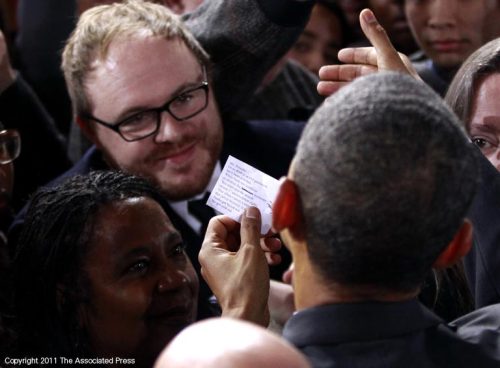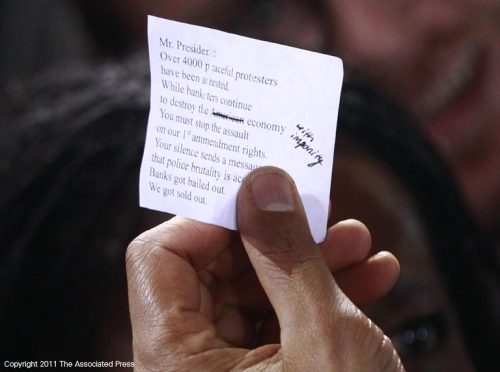In this video we witness cowardly cops using over-the-top para-military garbage on innocent young people. They should also have been chanting--"You are the 99%. We are the 99%....")
It is clear that the students in this video won the contest over who is stronger!!! These cowardly cops should be ashamed of themselves. Now, would they pepper-spray their own kids?
From Taibblog hosted in Rolling Stone Magazine:
UC Davis Pepper-Spray Incident Reveals Weakness Up Top
POSTED: November 22, 12:33 PM ET By Matt Taibbi
Was absolutely mesmerized last night watching the viral video of the UC-Davis pepper-spraying. It was totally amazing, simultaneously one of most depressing and inspiring things I’ve seen in many years.
To recap for those who haven’t seen it: police in paramilitary gear line up in front of a group of Occupy protesters peacefully assembled on a quad pathway. Completely unprovoked, police decide to douse the whole group of sitting protesters with pepper spray. There is crying and chaos and panic, but the wheezing protesters sit resolutely in place and refuse to move despite the assault.
Finally, in what to me is the most amazing part, the protesters gather together and move forward shouting “Shame On You! Shame On You!” over and over again. You can literally see the painful truth of those words cutting the resolve of the policemen and forcing them backwards.
Glenn Greenwald’s post at Salon says this far better than I can, but there are undeniable conclusions one can draw from this incident. The main thing is that the frenzied dissolution of due process and individual rights that took took place under George Bush’s watch, and continued uncorrected even when supposed liberal constitutional lawyer Barack Obama took office, has now come full circle and become an important element to the newer political controversy involving domestic/financial corruption and economic injustice.
As Glenn points out, when we militarized our society in response to the global terrorist threat, we created a new psychological atmosphere in which the use of force and military technology became a favored method for dealing with dissent of any kind. As Glenn writes:
The U.S. Government — in the name of Terrorism — has aggressively para-militarized the nation’s domestic police forces by lavishing them with countless military-style weapons and other war-like technologies, training them in war-zone military tactics, and generally imposing a war mentality on them. Arming domestic police forces with para-military weaponry will ensure their systematic use even in the absence of a Terrorist attack on U.S. soil… It’s a very small step to go from supporting the abuse of defenseless detainees (including one’s fellow citizens) to supporting the pepper-spraying and tasering of non-violent political protesters.
Why did that step turn out to be so small? Because of the countless decisions we made in years past to undermine our own attitudes toward the rule of law and individual rights. Every time we looked the other way when the president asked for the right to detain people without trials, to engage in warrantless searches, to eavesdrop on private citizens without even a judge knowing about it, we made it harder to answer the question: What is it we’re actually defending?
In another time, maybe, we might have been able to argue that we were using force to defend the principles of modern Western civilization, that we were "spreading democracy."
Instead, we completely shat upon every principle we ever stood for, stooping to torture and assassination and extrajudicial detention.
From the very start we unleashed those despotic practices on foreigners, whom large pluralities of the population agreed had no rights at all. But then as time went on we started to hear about rendition and extralegal detention cases involving American citizens, too, though a lot of those Americans turned out to be Muslims or Muslim-sympathizers, people with funny names.
And people mostly shrugged at that, of course, just as they shrugged for years at the insane erosion of due process in the world of drug enforcement. People yawned at the no-knock warrants and the devastating parade of new consequences for people with drug convictions (depending on the state, losing the right to vote, to receive educational aid, to live in public housing, to use food stamps, and so on).
They didn’t even care much about the too-innocuously-named new practice of "civil asset forfeiture," in which the state can legally seize the property of anyone, guilty or innocent, who is implicated in a drug investigation – a law that permits the state to unilaterally deem property to be guilty of a crime.
The population mostly blew off these developments, thinking that these issues only concerned the guilty, terrorists, drug dealers, etc. And they didn’t seem to worry very much when word leaked out that the state had struck an astonishingly far-reaching series of new cooperative arrangements with the various private telecommunications industries.
Nobody blinked when word came out that the government was now cheerfully pairing up with companies like AT&T, Verizon and BellSouth to monitor our phone and Internet activities.
Who cared? If you don’t have anything to hide, the thinking went, it shouldn’t bother you that the government might be checking your phone records, seeing what sites you’ve been visiting, or quietly distributing armored cars and submachine guns to every ass-end suburban and beyond-suburban police force in America.
We had all of these arguments in the Bush years and it’s nothing new to assert that much of our population made a huge mistake in giving up so many of our basic rights to due process. What’s new is that we’re now seeing the political consequences of those decisions.
Again, when we abandoned our principles in order to use force against terrorists and drug dealers, the answer to the question, What are we defending? started to change.
The original answer, ostensibly, was, "We are defending the peaceful and law-abiding citizens of the United States, their principles, and everything America stands for."
Then after a while it became, "We’re defending the current population of the country, but we can’t defend the principles so much anymore, because they weigh us down in the fight against a ruthless enemy who must be stopped at all costs."
Then finally it became this: “We are defending ourselves, against the citizens who insist on keeping their rights and their principles.”
What happened at UC Davis was the inevitable result of our failure to make sure our government stayed in the business of defending our principles. When we stopped insisting on that relationship with our government, they became something separate from us.
And we are stuck now with this fundamental conflict, whereby most of us are insisting that the law should apply equally to everyone,
while the people running this country for years now have been operating according to the completely opposite principle that different people have different rights, and who deserves what protections is a completely subjective matter, determined by those in power, on a case-by-case basis.
Not to belabor the point, but the person who commits fraud to obtain food stamps goes to jail, while the banker who commits fraud for a million-dollar bonus does not. Or if you accept aid in the form of Section-8 housing, the state may insist on its right to conduct warrantless "compliance check" searches of your home at any time –
but if you take billions in bailout aid, you do not even have to open your books to the taxpayer who is the de facto owner of your company.
The state wants to retain the power to make these subjective decisions, because being allowed to selectively enforce the law effectively means they have despotic power. And who wants to lose that?
The UC Davis incident crystallized all of this in one horrifying image. Anyone who commits violence against a defenseless person is lost. And the powers that be in this country are lost. They’ve been going down this road for years now, and they no longer stand for anything.
All that tricked-up military gear, with that corny, faux-menacing, over-the-top Spaceballs stormtrooper look that police everywhere seem to favor more and more – all of this is symbolic of the increasingly total lack of ideas behind all that force.
It was bad enough when we made police defend the use of torture and extrajudicial detention. Now they’re being asked to defend mass theft, Lloyd Blankfein’s bailout-paid bonus, the principle of Angelo Mozilo not doing jail time, and 28% credit card interest rates.
How strong can anyone defending those causes be?
These people are weak and pathetic, and they’re getting weaker. And boy, are they showing it. Way to gear up with combat helmets and the submachine guns, fellas, to take on a bunch of co-eds sitting Indian-style on a campus quad. Maybe after work you can go break up a game of duck-duck-goose at the local Chuck E Cheese. I’d bring the APC for that one.
Bravo to those kids who hung in there and took it. And bravo for standing up and showing everyone what real strength is. There is no strength without principle. You have it. They lost it. It’s as simple as that.
(http://eye-on-washington.blogspot.com)




